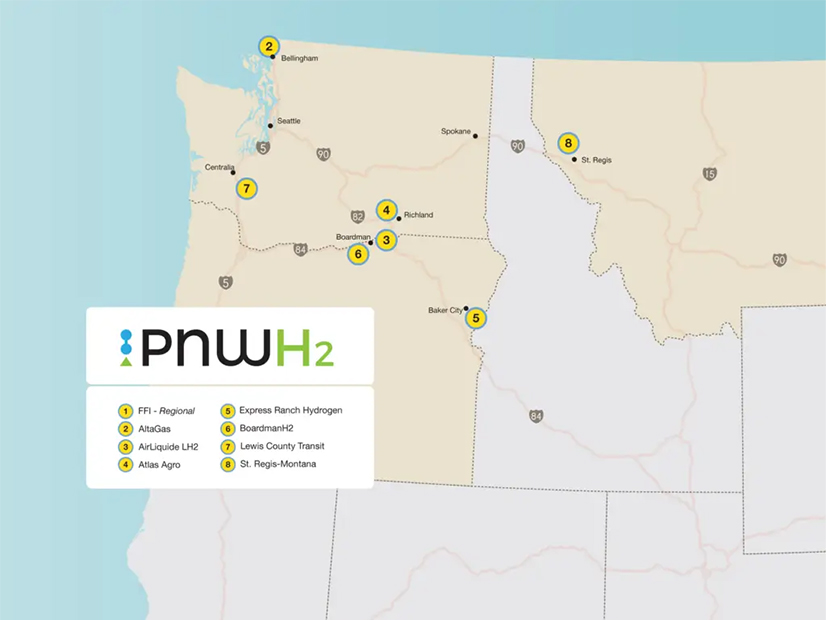
The Pacific Northwest Hydrogen Association (PNWH2) said July 24 that it had secured the first slice of the $1 billion U.S. Department of Energy grant the group won last fall to develop a network of clean hydrogen suppliers and consumers across the region.
Receipt of the $27.5 million in federal funding marks the official launch of the PNWH2 hydrogen hub, one of seven such hubs across the U.S. being supported by up to $7 billion in funds allocated through the Infrastructure Investment and Jobs Act. (See DOE Designates Seven Regional Hydrogen Hubs.)
The Northwest hub is the second to launch, coming on the heels of last week’s announcement that California’s Alliance for Renewable Clean Hydrogen Energy Systems hub had secured $30 million in its first round of DOE funding. (See California Reaches Funding Agreement to Launch Hydrogen Hub.)
Phase 1 funding for PNWH2 will be used to cover “initial planning, permitting and analysis activities to ensure that the overall hub concept is technologically and financially viable,” the group said in a statement.
The Northwest hub is intended to focus on production of “green” hydrogen, derived from the splitting of water molecules using electricity generated by emissions-free resources.
“We are excited to embark on Phase 1 and lead the way in building a new clean energy commodity in the U.S. that will benefit generations of families throughout the region,” PNWH2 President Chris Green said.
The group expects the hub to consist of eight “nodes” across Washington, Oregon and Montana “that will leverage the region’s innovative technology and abundant renewable energy to address the hardest-to-abate end users, such as public transit, agricultural products, medium and heavy-duty transport, and the electric power industry.”
The hub’s “partners” consist of a range of suppliers, including: Fortescue Future Industries, ALA Renewable Energy, Atlas Agro, Express Ranch Hydrogen and St. Regis Solar for production; Air Liquide for liquefaction and distribution; and Williams Field Service Group for transmission and storage.
Potential offtakers include Amazon for decarbonizing operations, Portland General Electric and Puget Sound Energy for electricity generation and Northwest Seaport Alliance for deploying hydrogen port trucks and cargo-handling equipment. Two hub partners, MHI Holdings and Lewis County (Wash.) Transit, plan to be both producers and consumers of the fuel.
Washington State University, with assistance from its Consortium of Hydrogen and Renewably Generated E-Fuels (CHARGE), will manage the “community benefits” plan for the hub in accordance with the Biden administration’s Justice40 initiative, which aims to ensure that 40% of benefits from federal clean energy investments flows to disadvantaged communities.
“These benefits will include the creation of more than 10,000 quality jobs and the development of STEM-based education programs from K-12 through college to ensure a pipeline of trained and qualified workers to build, then operate and maintain the hub’s hydrogen projects,” PNWH2 said.
Project management for the hub will be headed by AtkinsRéalis, a Montreal-based global engineering services company.
“I look forward to seeing how this effort helps us decarbonize transportation and industrial sectors and create good-paying jobs for Washington workers and families for decades to come,” Washington Gov. Jay Inslee said in a statement. “This is exactly what we have been working for here in Washington state over the last 12 years, and the PNWH2 is among the leaders in this effort.”
“Mitigating climate change requires enormous effort and prioritization of resources. It takes a multistate approach to get things done, like the Pacific Northwest Hydrogen Hub,” Oregon Gov. Tina Kotek said.
PNWH2 will host a webinar Aug. 21 to share more information about its Phase 1 plans.



